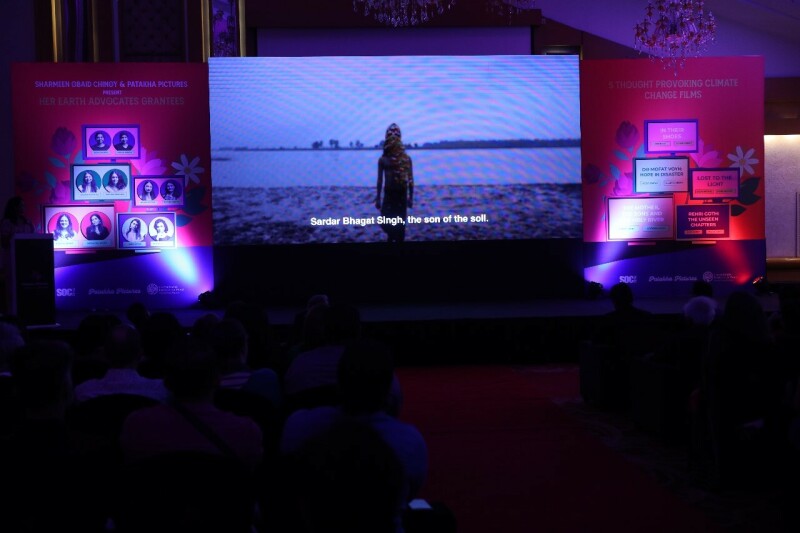Post-Kasur: This project helps people break silence over child sexual abuse
Trigger warning: sexual assault/child abuse
After the shocking findings about child sexual abuse (CSA) crimes in Kasur, a Facebook page called The Parting Project has taken an encouraging initiative to stand in solidarity with all the victims.
The page taglined 'There's beauty in parting' is known for its mini-stories about longing and lost love, but the owner of the page, student/graphic designer Syed Faizan Raza Rizvi, decided to use it as a platform to create CSA awareness by inviting all CSA survivors to share their experience. Promising anonymity, Faizan puts gripping excerpts of their stories on the posts he designs, and lets their stories run in their entirety below it.
Speaking to Dawn.com, Faizan shares the reasons for using his page to give voice to the silent survivors in our society:
 |
"The horrific story that surfaced from Kasur wasn't an isolated incident," Faizan said. "Child sexual abuse happens all around us, but we're not aware of it. Or rather, we choose not to acknowledge it precisely because it's a taboo topic. Parents think that they're keeping their children's innocent by not talking about these things. What they don't realize is that they're actually endangering them further and making them more vulnerable. When the child won't know what's happening with them is wrong, they won't let anyone know and the offender will continue their advancements."
While social media is yet to raise a real uproar, Parting Project is already on its way to show support to all those who have faced CSA. Explaining his initiative, Faizan delved deeper in the issue: "People have to start supporting victims who wish to come forward. That's the only way to keep conversation around the topic alive. We can either pretend that everything is rainbows and sunshine just to continue the charade of caring about children's innocence and morality, or we can actually step up, break the taboo of not talking about sexual abuse and truly protect this new generation. This is why I'm doing what I'm doing."
 |
Faizan reveals that he has received a heartrending response from the people:
"There's no one word to describe how the responses are. They're heartbreaking yet extremely inspirational. They're eye-opening. Most of the stories I've received are by people belonging to educated and privileged families. It just shows that this menace is everywhere, and your children aren't protected by barriers and gun wielding men outside your gate. It's not just girls opening up, but also boys."
With CSA considered taboo, Faizan believes that people are in desperate need for a safe space to express their feelings.
 |
In a culture where victim shaming is common, many request to remain anonymous and Faizan thinks they all have their reasons to do so: "They all have reasons, all very genuine and it's not just one. But if you take a quick look at our society that blames earthquakes on girls wearing jeans, you'll get the answer you're looking for."
While Faizan laments that few raise their voices against CSA, he admits that it doesn't come as a shock to him: "Over the past few years I've realized you're a fool if you expect a considerable majority to rise for a cause that doesn't directly affect them. Sure you can continue asking because that's part of making noise around issues, but don't expect a befitting response."
 |
Ignorance is considered bliss in many cases, but when it comes to harassment, lack of awareness is dangerous. Faizan stresses that raising awareness is one of they key objectives of The Parting Project: "For decades, we've ignored awareness of issues like CSA and we have its result in the form of the Kasur incident and countless similar ones that are happening closer than we think. If we ever wish to change that, we have got to start awareness right now."
This isn't the first time that 22-year-old Faizan has taken an initiative; when Karachi was hit by the recent heatwave, he raised funds by selling designs of artwork online and was able to accumulate considerable amount of money for the victims. But is it always easy to gather people for a cause?
 |
"People have always been supportive of whatever project I undertake. Precisely because I surround myself only with people who're supportive where supportive doesn't mean always appreciating, it means criticising in ways that I can use to better my approach," says Faizan.
"As for negative criticism, I've heard some very condescending comments every now and then, but I make sure that becomes a two-way lane. Also, I've been told I go overboard in supporting certain causes, but I believe in every single one of them matter how controversial or anti-religion they sound because half the time I'm standing up for myself, and that matters a lot to me."
There is no doubt that social media can play a vital role in times like these whether it be about raising awareness or assembling like-minded individuals. Faizan deems social media to be credit worthy but adds that it is not the sole solution: "After the news broke, if social media had not pushed back against the 'this is just a land dispute' narrative, this would've been buried again and the efforts of the reporters and journalists who uncovered the story would've been in vain. But social media alone isn't the answer. Social media along with concrete steps is. You can't just tweet and post. You have to be out there helping, while you tweet and post."










